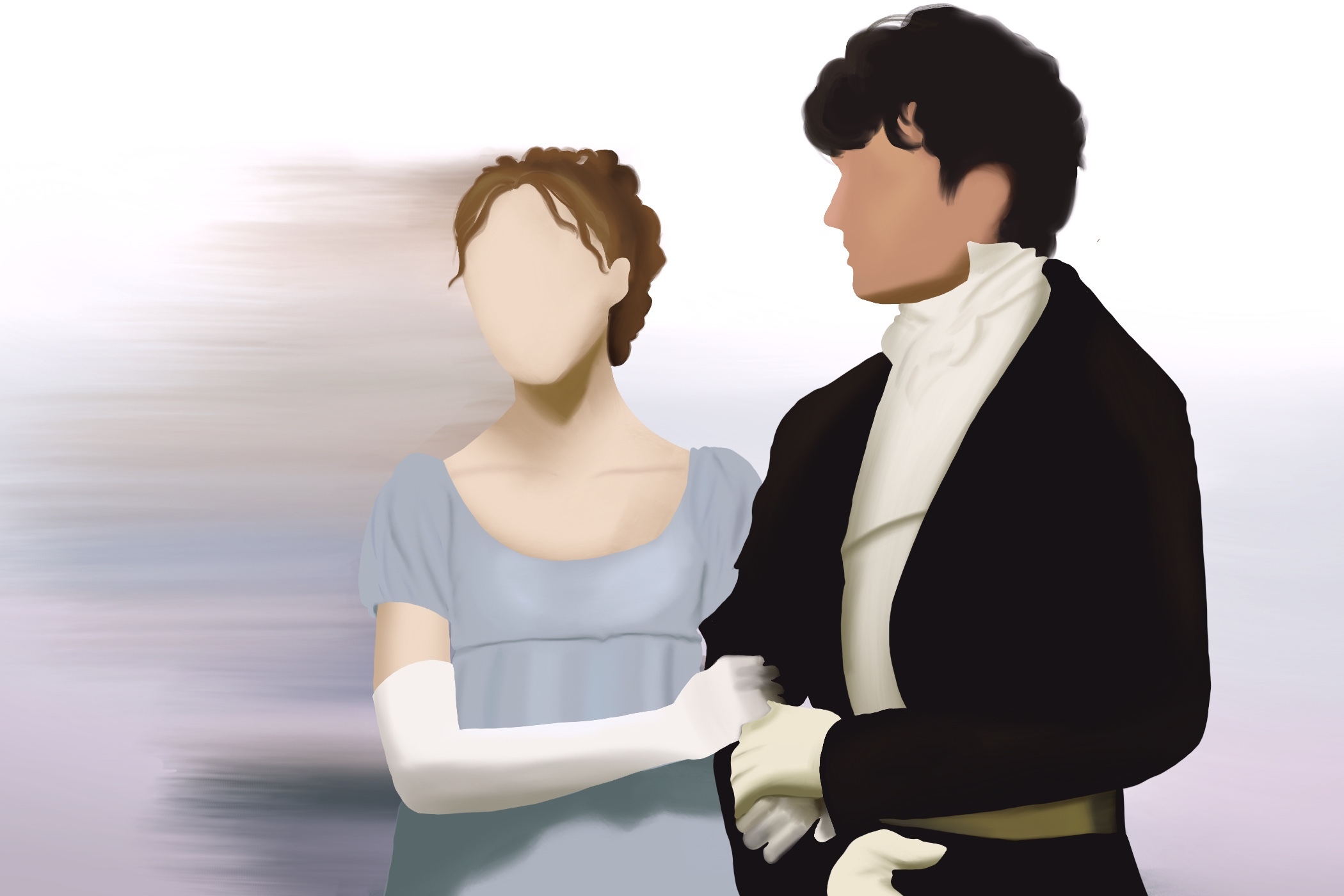Warning! The following article contains spoilers to the TV and book series “Bridgerton.”
Based on the widely popular historical romance book series “Bridgerton” by Julia Quinn, “Bridgerton” is the newest Netflix series to hit screens. It is a welcome Christmas present with steamy scenes, important life lessons and the obligatory romantic confessions in the rain. As a fan of the book series, I have been anticipating this television adaptation for a while. I wasn’t sure whether the TV series would be a complete failure, ruining the subtleties found in the novels, or a raging success, keeping 100% true to the plot of the stories. The reality is somewhere in the middle.
The season is dedicated to only one book, with hour-long episodes. This structure helped highlight the story’s complexities while keeping the core plotline accurate. For me, the TV series is wonderful because it is both able to keep the spirit of the book alive while adding entertaining subplots and character changes.
The first (and currently only) season is based on “The Duke and I,” which tells of a match between the Duke of Hastings Simon Basset and Daphne Bridgerton. In the book, they are the central characters, with others, such as the other Bridgerton siblings and members of London’s high society, staying mostly in the background. Nigel Berbrooke transforms into the dastardly suitor we see in the TV series. Marina Thompson becomes a desperate pregnant woman, trying to save herself from society’s judgment. The all-important Queen Charlotte does not even exist in the books. Other characters that are seen in the other books in the series are fleshed out, shedding light on character development and 19th-century society. Most importantly, however, the changes emphasize the importance of feminism and empathize with the unfortunate who are crushed under society’s foot.
The Plight of Women in the Bridgertons’ World
One of the scenes that stayed with me is the birth of Basset in the second episode. A maid rushes to bring clean towels to the room, while Basset’s mother is sweating and screaming, trying to give birth. Though she is clearly in pain and lays on bloody sheets, his father, in contrast, is shown pacing and demanding to know if the baby is a boy, an heir to the distinguished Hastings line. Lady Danbury, a formidable woman and a fan-favorite character, tries to rush into the delivery room to help the Duchess of Hastings. She is blocked and, instead, Basset’s father goes in first, joyfully grabbing his long-awaited son to present to awaiting men — not allowing the Duchess to hold him even while she holds out her arms beggingly. As the father boasts to other men, it becomes clear that the Duchess is dying, yet only Lady Danbury is there to hold her hand and comfort her. The juxtaposition between the audio and the visual is jarring: Raucous male cheers fill the air while a near-forgotten woman bleeds to death.
Basset’s father is acknowledged as exceptionally cruel. However, society’s expectations for women to merely be broodmares for children is emphasized, scene after scene. When Daphne Bridgerton becomes upset, her mother Violet Bridgerton attempts to comfort her by saying that she soon will have children to take care of. When Marina Thompson asks Lady Featherington how she could bear a loveless 22-year marriage, Lady Featherington says children helped her. When Eloise Bridgerton tries to explain her fear of marriage to Daphne, she talks about hearing their mother’s screams when giving birth to their youngest sister. Bearing and raising children is the purpose of women in this world — without children, women seem to have no value.
Because of their status as bearers of potential heirs, ladies and their decisions are controlled by the iron fists of men. As Daphne Bridgerton declares when her brother refuses to listen to her about her relationship choices, “You think that just because I am a woman, I am incapable of making my own choices.”
Another consequence, as magnificently illustrated by the TV adaptation, is that women are expected to remain virgins until marriage, while men are not. This is clearly portrayed from the very beginning. While Daphne prepares for her introduction to society and wears chaste white like all the other young ladies, her oldest brother Anthony Bridgerton is having sex with a woman against some tree. Virginity assures the lords that their line remains unsullied. If there is even a hint of premarital relations, a woman and her family’s reputation is completely ruined. Berbrooke uses this to his advantage to blackmail Daphne into marrying him. Even though he is the one who tries to sexually assault her while alone in the garden, she and the rest of the Bridgertons would suffer social consequences if people knew. The lack of accountability Berbrooke faces for his horrendous acts and odious sentiments illustrates the powerlessness of women.
Sex education for women is nonexistent in the Bridgertons’ world. Daphne does not know what masturbation or sex is. When Thompson is revealed to be pregnant while unmarried, Penelope Featherington and Eloise, both intelligent adult women, are puzzled as to how this could happen. They were taught that children come because of marriage. Lady Featherington warns her daughters away from Thompson by calling pregnancy contagious.
The Sexual Assault Controversy Casts a Shadow on ‘Bridgerton’
The lack of sex education is appalling and holds true for the time period, and the author and the creators of the series use this to create a pivotal scene in both the book and TV adaptation. This scene is controversial.
Because of his father, Basset seeks revenge by discontinuing the Hastings line. He tells Daphne that he cannot have children. Not knowing what is necessary for pregnancy, she assumes that he is physically incapable of siring children. When she finds out that Basset can have children and that his physical withdrawal is preventing pregnancies, she feels betrayed that Basset inadvertently took advantage of her ignorance. She decides to take matters in her own hands.
In the book, she takes advantage of a severely drunk Basset. In the TV series, she forces him to finish inside her. In both, Basset is left feeling betrayed as well, destroying the trust that laid the foundation for their intimacy together. In my opinion, the book scene is worse because of Basset’s drunken state. However, I still consider the TV version to be sexual assault, worsened by the fact that the characters never acknowledge Daphne’s wrongdoing. Like other fans, I feel torn. This scene is important for the plot and is an improvement from the book, yet it still feels like it was not handled well enough.
An Over-Simplified Story Of How Racial Equality Was Achieved in the Bridgertons’ World
Besides the sexual assault controversy, another sore point is the TV series’s weak and irresponsible commentary on racial equality. In the books, all the characters are white. In the TV version, we see people of color all over society, including as main characters.
The Duke of Hastings is played by Regé-Jean Page and Lady Danbury is played by Adjoa Andoh. Both actors are Black. Unlike “Enola Holmes,” this series tries to explain why the society is mixed-race. When Lady Danbury attempts to persuade the Duke that love conquers all, she briefly mentions that because King George III fell in love with Queen Charlotte, a mixed-race Black woman, people of all colors came together and discrimination ended. This ridicules the important fight for equality. It is similar to those who claim that racism has ended in the United States because we elected Barack Obama — even while more Black people are killed by the police than white people, Black women are four times more likely than white women to die in childbirth and POC still lack full voting rights. Instead of being some sort of revolutionary statement on racial equality, this storyline undermines the work of civil rights activists. Though this statement was one sentence in an eight-hour-long show, it stuck out like a sore thumb.
Final Thoughts
While the series certainly sheds light on the despicable side of society and has a few issues, they are tempered by stunning fashion, mansions and scenery. It still remains one of my favorite TV series to come out of 2020. Starry-eyed romantics, be prepared to swoon. People looking for wholesome family relationships and friendships, be prepared to coo at adorable bonds. Lovers of drama and intrigue, prepare to gasp. I, for one, am already impatient for the next season.

















